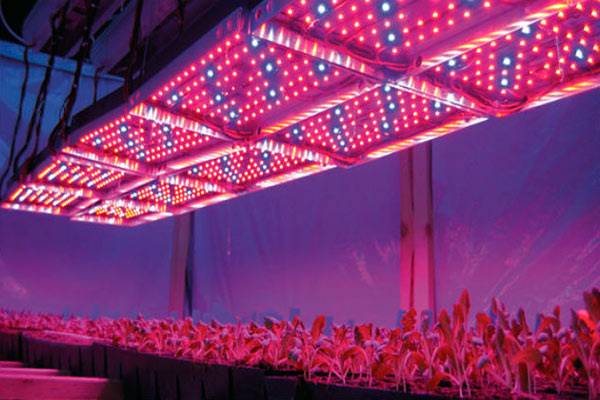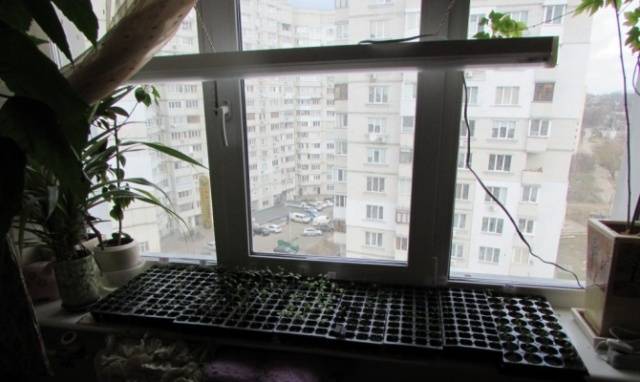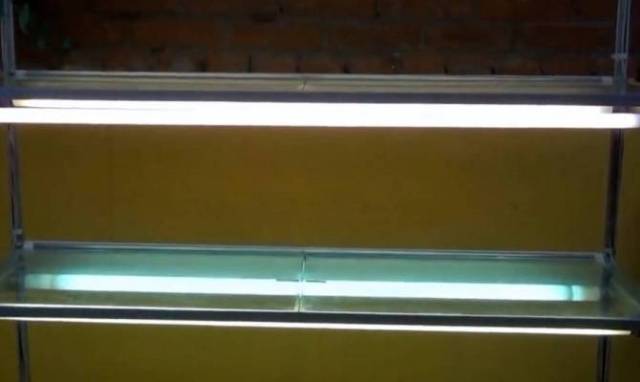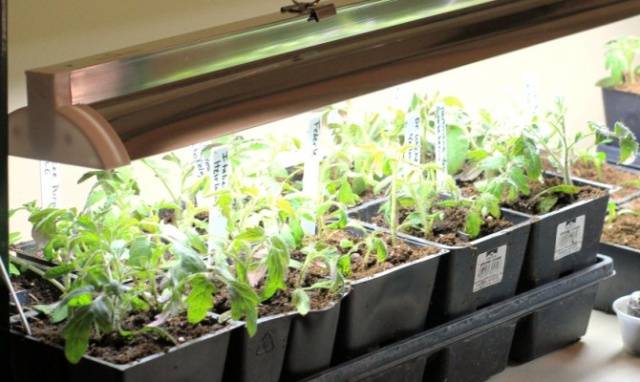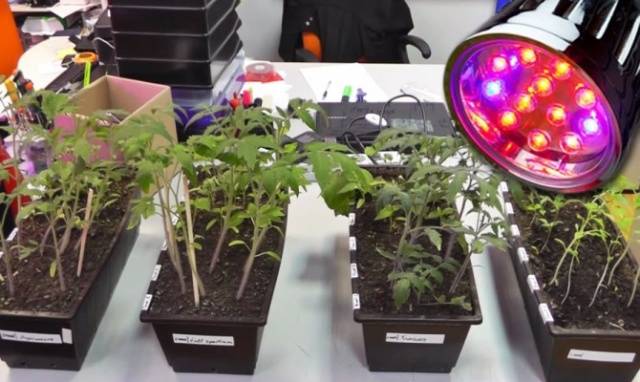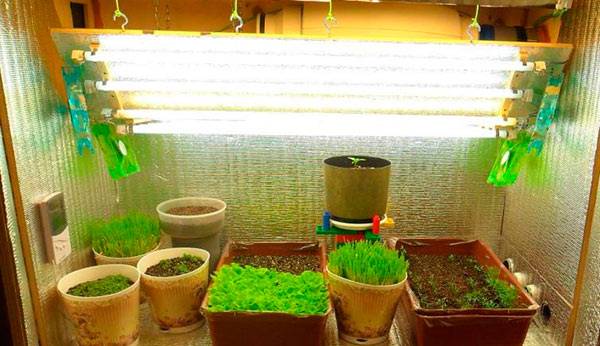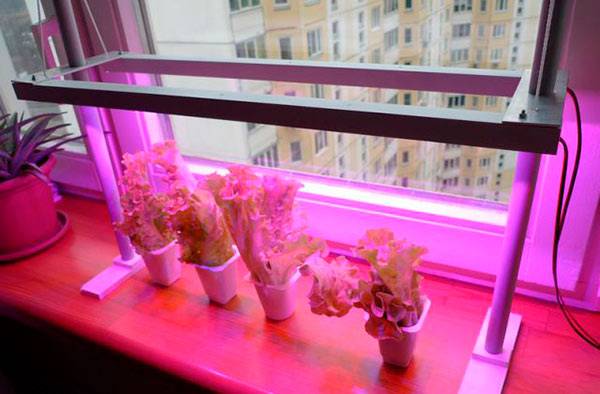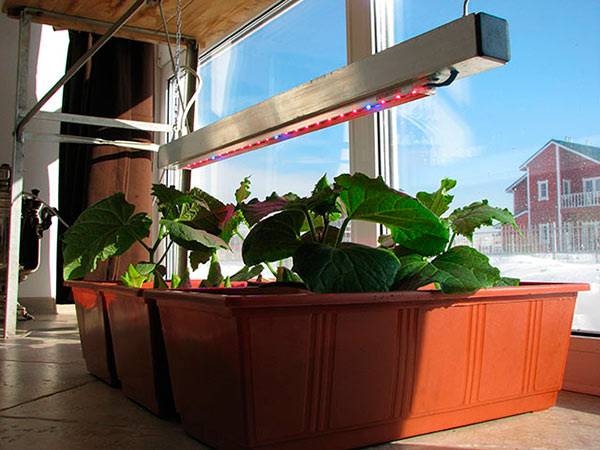Content
During the day, the seedlings on the windowsill have enough natural light, and with the onset of dusk, you have to turn on the lamp. For artificial lighting, many owners adapt any suitable device. Usually you come across a table lamp or just hang a cartridge with a paw. In fact, the lighting for seedlings on the windowsill should not be primitive, otherwise it will do more harm than good.
Plant-friendly spectrum
Seedlings require 12 hours of lighting per day. From February to March, daylight hours are short. In the early morning and with the onset of dusk, artificial lighting is turned on. The lamps are turned off at night. Plants won't benefit from 24/7 lighting. Another important issue is the correct choice of lighting fixture. Seedlings develop optimally in natural light with sunlight, as they receive the entire necessary spectrum. When choosing a lamp for backlighting, this nuance is taken into account first of all.
The light spectrum consists of twelve segments, each of which is divided into color groups. Vegetation responds differently to each spectrum. The most useful are:
- Red light increases the synthesis of chlorophyll, accelerates seedling and sprout development. Deficiency causes deformation of plants.
- Blue light weakens the growth of the stem, but the plant benefits from it. The seedlings do not stretch, but become firm. The stem thickens due to accelerated cell division.
Yellow and orange light does not affect the development of plants in any way, which is why it is useless to use traditional incandescent lamps for illumination. Green light similarly does not provide much benefit, but hardly anyone uses devices with such a glow.
Is daylight enough
Lack of daylight due to short day lengths is one part of the problem. Seedlings stand on the windowsill behind each other. Plants closer to the window shade distant plantings. And if it stands on the windowsill rackthe light falling from above from the window covers the shelves of the higher tier. The second problem arises - the lack of lighting during the day.
The seedlings begin to reach for the cocoon glass. The stems become thin. The leaves are lethargic, underdeveloped. They try to solve the problem by turning the boxes. From careless movements, the sprouts break or fall to the ground.
High-quality backlight features
Optimally set seedling shelves on a backlit windowsill so that the entire area with the planting material receives diffused light evenly. The benefits of lighting can be obtained if three important conditions are met:
- intensity;
- optimal spectrum;
- duration.
Plants develop fully at an illumination intensity of 8 thousand lux. It is difficult to achieve such results with lamps. The norm of intensity for artificial lighting is considered to be 6 thousand lux.
The spectrum affects the development of plants. Sunlight is taken as a standard. Artificial lighting cannot achieve such results. When to choose lamps for illumination of seedlings on the windowsill, take into account the possibility of its radiation of red and blue.They are responsible for the rapid germination of seeds, the development of plant cells, and the process of photosynthesis.
The duration of illumination depends on the grown planting material. Usually this period is 12-17 hours. The lamps are turned off at night. Round the clock seedling lighting on the windowsill is required during the initial stage of sprouting.
Choice of light sources
The owners often make lighting of seedlings on the windowsill with their own hands from what is on the farm. First of all, you come across household table lamps with a traditional incandescent lamp. The choice is very poor. The lamp emits a yellow color that is useless for plants and a lot of heat. If the appliance is located low, there is a danger of burning the foliage.
An electrical store sells a huge variety of lamps, but LEDs, fluorescent tubes, or phytolamps are best suited to illuminate planting material.
Fluorescent tubes
A windowsill seedling fluorescent lamp is a common daylight fixture. Lamps are often used in an apartment to illuminate a room. Housekeeping lamps fall into this category, but they are inconvenient due to their small illumination area. Lamps are best suited for illuminating seedlings on a tube-shaped windowsill. The product can be selected according to the length of the window sill. So, for a standard window opening, lighting from fluorescent tubes 1 m long is suitable.
Lamps differ in color temperature: soft, cold and others. The indicator is measured in kelvin (K). If, for example, there is a number up to 3000 K on the product packaging, then the glow will be yellow. For backlight seedlings fit fluorescent tubes with a color temperature in the range of 4.5 thousand K.
LEDs and phytolamps
Conventional LED windowsill seedling lamps are suitable as they have blue and red colors in their spectrum. LEDs do not emit heat, consume little energy, and are safe to use. LED chandelier lamps give off warm and cool shades of daylight, but there is a better option for illuminating seedlings.
LED strips red and blue light allows you to create an optimally favorable spectrum for plants. They are sold in rolls of 5 m. There is a sticky layer on the back side. When the illumination of the seedlings on the windowsill is arranged with their own hands, the tape is glued to the back of the shelf of the upper tier of the rack or inserted into the profile.
The quality of the backlight depends on the characteristics of the LEDs. Expensive lamps or ribbons are capable of emitting light up to 6 thousand lux.
The most effective is a bicolor lamp for seedlings for the windowsill, equipped with a standard E 27 base. There are 12 LEDs inside the body: 9 - red and 3 blue.
There are phytolamps from other companies, but they must be chosen correctly. A high-quality model has a body made of a heat-conducting metal alloy. The element serves as a radiator. Cheap phyto-lamps are made with a plastic case, the walls of which have small slots for ventilation. With prolonged operation, the plastic does not have time to remove heat and melt quickly.
The video shows a backlit rack:
Lighting arrangement rules
It is necessary to install the lamps for illuminating seedlings on the windowsill correctly, otherwise they will be of little use:
- The minimum height of the lamp from the seedlings is 10 cm. It is better to make the backlight from height-adjustable lamps. Different groups of plants prefer a certain amount of light. By adjusting the height, optimal brightness is achieved.
- Foil or mirror reflectors will help spread light evenly and direct into dark areas.
- It is better to cover lamps on homemade lamps with matte caps for better light diffusion.
A dimmer will help make modern lighting.The regulating device is installed in the electrical circuit. A dimmer adjusts the brightness of the lamps, bringing artificial lighting closer to natural daylight.
Backlight manufacturing options
To illuminate the seedlings, it is optimal to take ready-made lamps with a length of 1 m in the store.If the width of the window opening is larger, you can place two short lighting devices side by side.
If a rack is installed on the windowsill, the lamps are suspended from the lintels of the shelves. The ropes or chains are made adjustable so that you can change the height of the device above the seedlings.
If there is no rack, and the seedlings just stand on the windowsill, a stand is made for the lamp. The easiest option is to make two racks from the bars, and fix a rectangular frame on top.
A good DIY lamp for seedlings on the windowsill will turn out from blue and red LED strips. As the base of the lamp, a wooden plank is suitable, 5 cm long less than the width of the window opening. Two aluminum profiles are screwed to the bar with self-tapping screws parallel to each other. Blue and red LED strip is glued inside. The excess is cut off with scissors according to the marking. The ends of the LED strip are connected with connectors to wires and connected to the power supply. The finished lamp is hung on a rope or chain.
Whichever side of the building the window is located, backlighting is needed when growing planting material on the windowsill. The lack of artificial lighting will affect the poor harvest in the fall.
